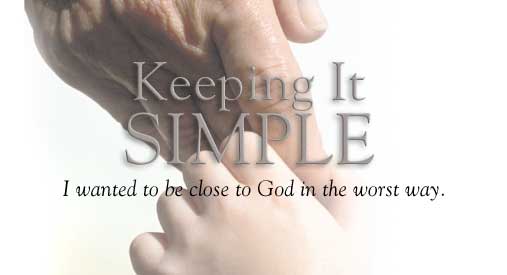 HRIST'S DECLARATION ABOUT children, "of such is the kingdom of heaven" (Matt. 19:14), always seemed a sweet sentiment. But my son Ryan, then age 6, brought it to life for me by teaching me a profound truth early one morning.
HRIST'S DECLARATION ABOUT children, "of such is the kingdom of heaven" (Matt. 19:14), always seemed a sweet sentiment. But my son Ryan, then age 6, brought it to life for me by teaching me a profound truth early one morning.
God found me when Ryan was just 3. Walking with God in those early months and years after awakening to the reality of the gospel was wonderful. So inspired, spontaneous, and exciting, it seemed natural and effortless. Fresh insights abounded. And the future promised ever-expanding growth and deeper meaning.
But gradually, quietly, without fanfare, the exhilaration of those early days with God began to fade. It seemed as if my newfound Friend was becoming further away and harder to reach. Concerned, I redoubled my efforts. More reading, Bible study, prayer. Still, the distance increased. One sad day I finally had to admit that I had lost my first-love experience.
I believed God was real, and I remained committed to Christ's cause. But my daily connection with the God of Abraham began to seem like a chore; the "person" of God began to lose His "personality." It felt like some supernatural game of hide-and-seek: and it was my turn to find the "hiding" God (He having found and awakened the "sleeping" me in the summer of 1994).
Connecting with God became more of a struggle as I tried to make my walk with Him regain its early vigor and exuberance. Vibrance, vitality, and reality in my devotional life slowly gave way to an abstract, listless sort of aimless wandering. A mechanical dullness that translated into a lack of purpose and diminished meaning for the rest of my life set in. I sensed deeply a loss of relationship with this God who now seemed hidden, yet I was uncertain how to move ahead.
Questions multiplied: Are personal devotions for God or for me? Are they mandatory or optional? What are the mechanics of devotion? How do I "do" it? Why doesn't "trying harder" seem to work? Why should I even care?
Whoa!
These questions were weighing on my mind one morning. The day ahead loomed long and busy. As I showered I was startled to see Ryan sitting quietly on the nearby chair. This being a full hour and a half before his usual wake-up time, I assumed something was wrong.
"Are you OK?" I asked.
His answer hit me like a bolt: "Dad, I just wanted to be with you," he replied in a contented peacefulness, his eyes half closed.
In a moment of insight all my perplexing questions about how to relate to God came into sharp focus. My son-my friend with whom I had played catch the evening before, my responsibility to whom I had been obligated to administer a "time-out" recently- just wanted to be with me.
 Echoes of a covenant God filled my mind: a God who just wanted to be with the people He had created.
Echoes of a covenant God filled my mind: a God who just wanted to be with the people He had created.
Could my approach to God be just as simple, straightforward, and comfortable as my own son's approach to me? The answer I felt so powerfully packed incredible implications.
Closeness, accessibility, warmth, acceptance, trust, friendship-all described my relationship with my son. Further, his desire to be with me was matched by my desire to be with him. Relationships just seem to be that way (although 5:30 a.m. is perhaps not a common time to show it!). Perhaps this innocent eagerness for relationship and friendship is what Christ commended as a core qualification for His kingdom.
That God uses the spectrum and intensity of human relationships-lovers, husbands and wives, parents, siblings, friends-as analogies for our relationship with Him is plainly seen in the Bible. He knows the difficulties we have relating to the mysterious and awesome supernatural being He is. So He sent Jesus, His Son, to show us who He really is, what He is really like, and to teach us how truly near He is. Rather than minimize human relationships, God elevates them by using them as models of how He wants to relate to us; how He feels about us.
The human relationships that God has blessed us with bear closer inspection. From the surface these interactions seem to involve the use of our five senses-sight, sound, touch, taste, smell. But soon after this personal moment with Ryan, I found myself in the flow of a hectic and long day. Yet my awareness of relationship with my son and its realness was extraordinarily intense. Though absent from him and his ready smile, his goodbye hug, his pleasant voice, I knew keenly the reality of our shared friendship.
An Unseen Reality
To reduce this reality to just memories, or simply to assign this overwhelming sense of relationship to programmed reactions of chemicals inside of neurons, seemed absurd. What I felt didn't depend on his physical presence; rather, it went beyond it.
There is, it seems, another sense- a sixth sense, as it were, in which relationships occur. This becomes clear when I try to reduce human interaction to our five senses. That relationships transcend these is demonstrated for me in that my sense of relationship with my own dad, who died in 1986, continues to grow even now-without any actual presence, physical or otherwise. The reality of my relationship with my father continues to evolve, even without the physical reality of experienced senses. Surely this aspect of human experience is part of what it means to be made in the image of God. The ability to experience relationship simply defies the observable and measurable entities of science and goes into the realm of meaning, joy, truth, and purpose.
In this realm of relationships the God of the universe has chosen to meet with me. While the physical presence of loved ones is clearly preferable to relationships in their absence, the essence of a relationship is retained and can continue to grow in spite of physical separation.
The warmth of that early-morning moment with my son lingered long after it was over. Indeed, it grows today. The nature of relationship I experience every day in my human relationships is that which God cultivates with me each moment of every day. The only way Adam's walk with God in the cool of the day was different from what mine can be is God's absence in physical form. And this is only a temporary situation brought about by sin.
In the meantime, I still have full access to God in the realm of relationship-that sixth sense-that doesn't depend on physicality. My trust in God allows me to know this: not unlike my son's trust that when I come home from work I'll be with him in person and we'll play catch.
We'll be together.
No longer must I struggle to relate with this supernatural God who exists in some incomprehensible form and place. Rather, He gives me a context in which I can relate to Him: my own human relationships. Relate to Me-no, love Me, God seems to beg, as you do your child, your friend, your lover, your parent.
As this reality dawned on me, I felt sorry for God as His Word leaped to life with His calls, pleas, and near-desperate desire for relationship. Even to the extreme measure of allowing His own Son to live among, then die at the hands of, the very ones He tried so hard to win into a saving relationship.
Make It Real
This truth breathes vast new depth of meaning into the two positively stated centerpieces of the Ten Commandments: the fourth and fifth-commandments that affirm relationships. Acknowledging the reality and importance of our origins by honoring our heavenly Creator as well as our earthly "creators" (parents) elevates relationships. This makes the Sabbath an even richer gift as a day to celebrate and extend both heavenly and earthly relationships. The Sabbath is a two-way vehicle for relationship between God and His family of sons, daughters, and friends.
Soon practical implications of God's desire for relationship with me began to take shape. When I use God's own suggestions for how to relate to Him(in addition to our own human relationships with each other), time in God's presence becomes very real. While my human relationships may puzzle me at times, every day I experience how they work. And it is in this context that God invites me to relate to Him. Seen in this light, "Ijust want to be with You, God" makes perfect sense, in much the same way my son just wanted to be with me, and I with him.
Our daily devotional experience may include systematic, directed reading, specific searches, and Christ-centered authors. But it may also include quiet time, pensive meditative time, time "just being" with God. Good as these things may be, though, if they become an end in themselves, they become empty. Like the traveler who has forgotten his destination, devotions separated from the relationship desire "just to be with You, God" can become hollow and empty. The thought of my son wanting to be with me out of duty seems unimaginable. He knows me and wants to be with me. It's about friendship: spontaneous, uncoerced, heartfelt relationship.
Thank You, Holy Father, for the gift of my son, and the gift of Your Son, that shows me how I might relate to You. All I want, God, is to be with You.
_________________________
Robert Rigsby practices anesthesiology at Florida Hospital in Orlando, Florida.


